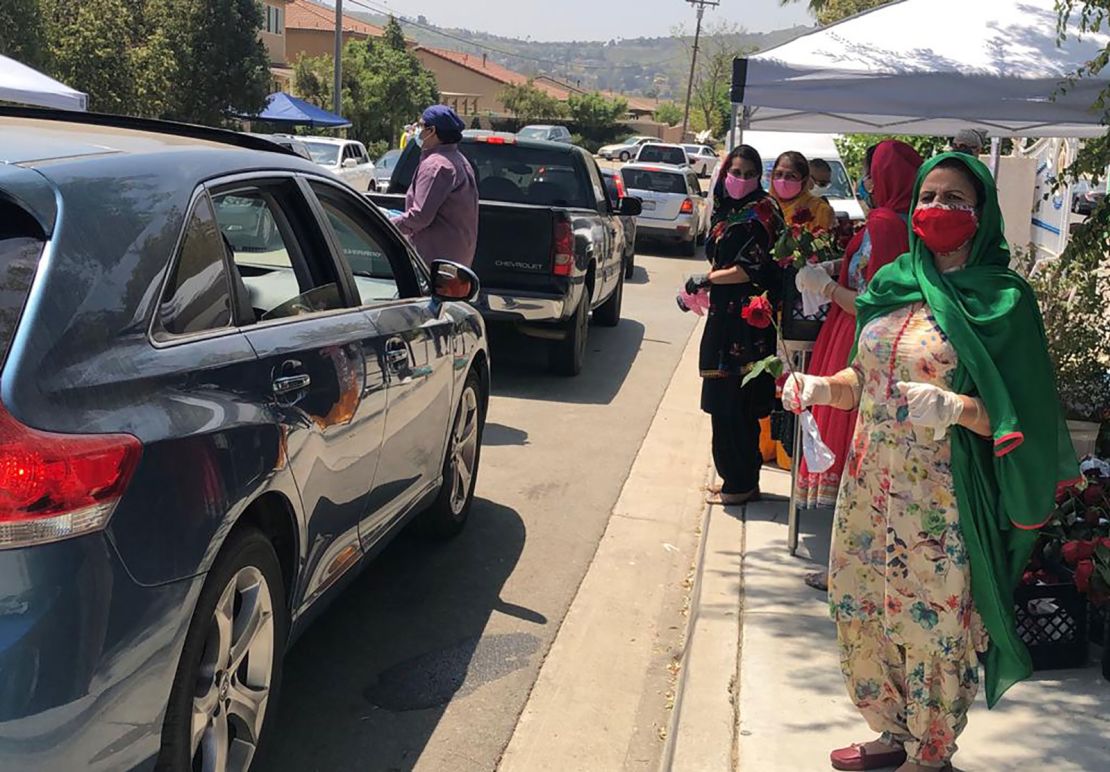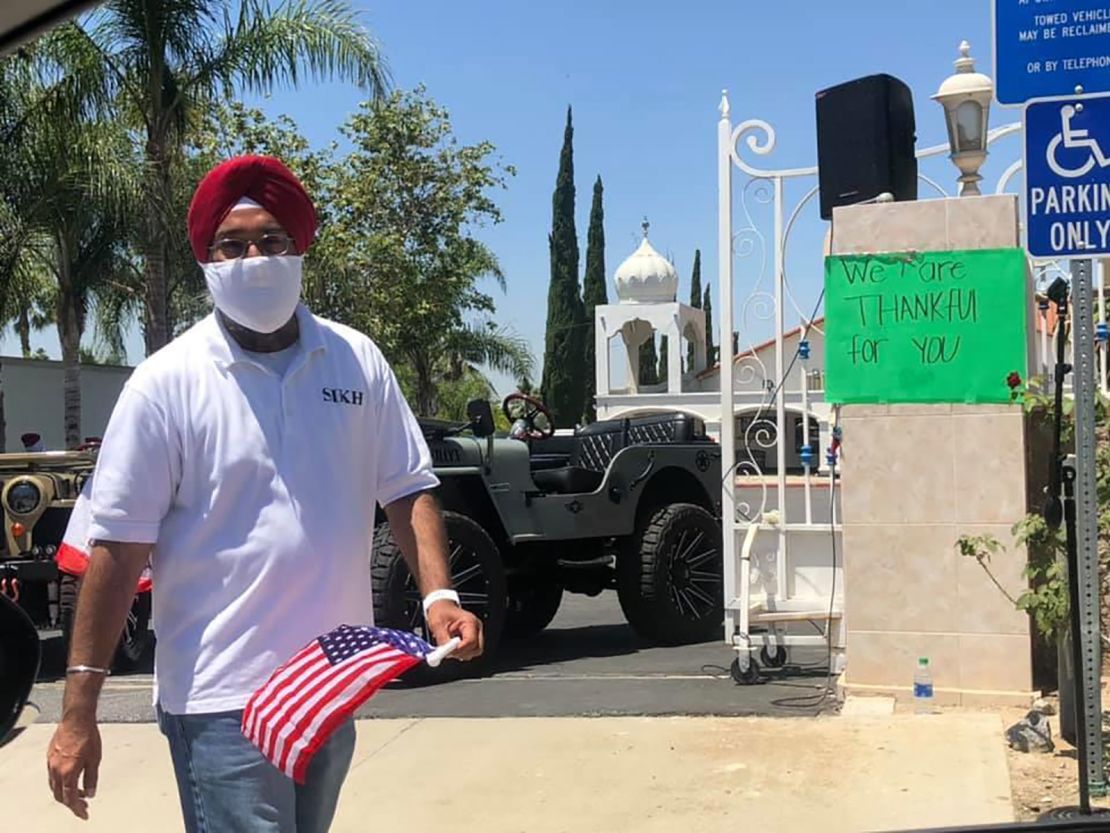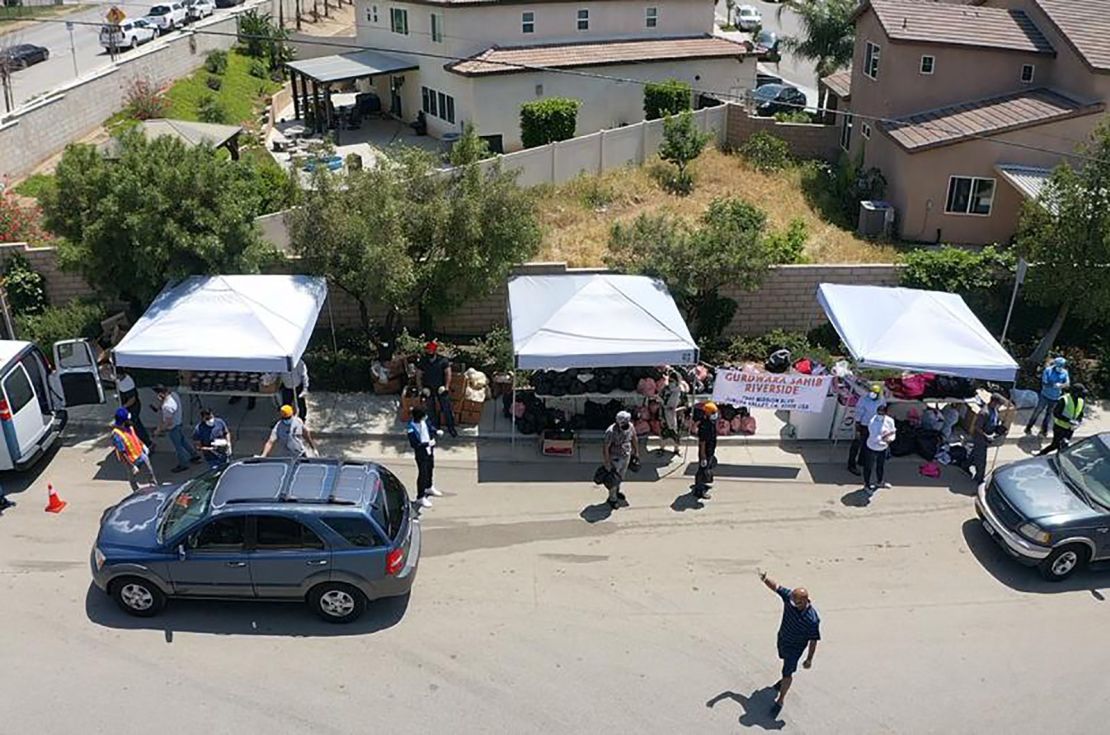When Gurpreet Singh and other members of the Sikh community in Riverside, California, started to organize efforts to provide food assistance in the early days of the coronavirus pandemic, Singh figured it would simply be a variation on the work the Riverside Gurdwara had been doing for years.
“When the pandemic came along,” Singh told CNN, “the Sikh temples were shutting down, and that didn’t seem right. At times of dire need, you don’t close down, you open up.
Worldwide, Sikh temples, also known as Gurdwaras, offer free meals to anyone who shows up. Known as Langar, it’s a tenet of faith and a key part of the Sikh religion, which emphasizes a concept of selfless service to the community at large.
In the pre-pandemic days, the Riverside Gurdwara was used to providing 800 to 1,000 meals each Sunday, its busiest day, Singh said. So the community, unable to gather in large groups inside the temple because of pandemic restrictions, decided to serve food out front — Langar-by-drive-through.

“We thought, ‘we’ll run it two or three days a week – good deed done, pat on the back,’” Singh said. Within the first week, however, “the lines got crazy.”
Singh said he quickly realized the scope of the problem.
“Hunger has no days off,” he said, “so there’s no way we can serve less often than every day.”
On the busiest days, Singh said, the line of cars can reach two or three miles long.
Selfless service
As an organized religion, Sikhism is relatively new.
Founded some 500 years ago in the Punjab region of India, the faith has some 30 million adherents, making it the fifth largest religion worldwide. Conservative estimates place the number of Sikhs in the United States at just over half a million.
Among the principles of the Sikh faith is Seva – “basically, ‘selfless service,’” explained Vaneet Singh, a member of the Sikh community in Memphis, Tennessee. “It’s so engrained in our faith, it’s everywhere.” (The Singh surname is a traditional and common one for Sikh men.)

“We believe that to serve others, to help others, is a key to who we are,” he said.
Perhaps the most visible example of Seva to a non-Sikh, is Langar — the practice of a free community kitchen based in a Sikh temple and open to all.
“The concept of the common kitchen is you sit together on the floor and eat together — you are all equal in God’s place,” Singh said.
But as the coronavirus pandemic sweeps the nation and a jumble of restrictions, shutdowns and distancing precautions has kept the Sikhs from inviting their neighbors in, several communities have found new ways to break bread.
It’s an act of service that, in the face of massive need and fear of infection, has required commitment, devotion and careful planning.
Memphis: Providing for essential workers
The Mid-South Sikh Sabha, on the outskirts of Memphis, is the only Gurdwara for 100 miles in any direction, Singh said. The community is small, no more than 300 people at its most active, by his estimate. At the beginning of 2020, Singh said he was focused on interfaith outreach, connecting with Christian and Jewish communities in the greater Memphis area.
“Then — boom — coronavirus came along,” he said.
“As a community, we thought, ‘OK, how can we contribute?’” he said. It was a question made all the more difficult by the fact that the pandemic meant services in the Gurdwara were suspended.
Together with a small team of volunteers, Singh coordinated food donations to local hospitals and aid organizations.
Initially they provided meals to healthcare workers in Memphis hospitals. Working long shifts in a city mostly devoid of restaurants, the city’s essential workers were having a hard time finding food, Singh said.
The University of Memphis reached out as well, Singh said, and asked for food for their international students stranded by the pandemic.
Volunteers took food around Memphis in masks and gloves, and a small group of volunteers took precautions working in the Gurdwara’s kitchen.
In all, Singh said, his small community distributed 1,700 meals before pausing to reassess.
“I hope and pray that this goes away,” he said, but he expressed concern about another rise in coronavirus cases. “I don’t know how long we have to continue this.”
St. Louis: 1,500 meals a week
Up the Mississippi River, Deb Bhatia and the volunteers of his non-profit, the Sikhs of STL, had organized similar efforts in St. Louis, Missouri.
When the state started to shut down, Bhatia said, he reached out to his local Gurdwara to ask about using its kitchen.
“When we started, it was for two shelter homes,” he said.
Before the pandemic, Bhatia organized volunteers from the Sikh community to go volunteer at local shelters. As fear of the coronavirus spread, Bhatia said shelters told him they weren’t getting enough volunteers to run their own kitchens.
So with four volunteers, Bhatia set the modest goal of making and donating 150 hot meals. But as he started making deliveries, he said he noticed more and more people in need.
“We started driving for hours downtown, bringing people food,” he said. A large group of homeless St. Louis residents had set up tents in front of City Hall, and Bhatia began making weekly visits to deliver meals.
Before long, the Gurdwara’s kitchen wasn’t large enough, Bhatia said. The demand had grown to 1,500 meals a week.
Bhatia said 85 families have volunteered to make meals in their kitchens at home. Bhatia himself does all the shopping. On Wednesday, volunteers come to get groceries from his home. By the weekend, they bring him meals to deliver by van to a dozen shelters across St. Louis.
The idea is to minimize his volunteers’ exposure, he said. “A lot of elderly and kids – I didn’t want them to go out. It’s my responsibility.”
Funding has been a team effort, too, Bhatia said. A GoFundMe he setup was fulfilled in two weeks’ time.
“It’s not only the Sikh community,” he said when asked who donated, “it’s the whole community.”
In recent weeks, as the state of Missouri has reopened, Bhatia said that requests for food had gone down slightly. But he said he was prepared to keep offering support.
“The fear is still there in people,” he said.
Food truck dream on hold
Across the country, Japjot Sethi, a software engineer in San Jose, California, turned an idea for a new way to serve the community into a large-scale operation.
Sethi said he’d had a crazy idea back in 2019. He’d been volunteering his time at homeless shelters since he came to America 20 years ago, but he wanted to do more.
“I started this last year with the crazy idea that there should be food trucks with free food on street corners,” Sethi said.
He was in the middle of starting a nonprofit and shopping for his first truck when the pandemic hit.
He’d already gathered a few volunteers and had started renting space in a commercial kitchen, so he and his partners decided to put the truck on the backburner and help get food to area homeless shelters.
“The shelters were in a dilemma,” Sethi said. “They get the food from restaurants, and the restaurants were shut down.”
Sethi, like many of the Sikhs who spoke to CNN, referenced the concept of Dasvandh — a religious obligation to give 10% of your income to good causes.
With the work he had already done in preparing for his nonprofit, Sethi said he could start cooking meals at a cost of no more than $2 each. He gathered together seven volunteers and got to work.
Vegetarian meals
Langar food is typically vegetarian in an effort to meet the dietary requirements of anyone who might attend. Asked whether he followed the same guidelines in his commercial kitchen, Sethi said that for him, it’s also a logistical concern.
“I have a very strict chef. He says vegetarian food will last longer than any meat,” he said. “We’re keeping all food hazards in mind.”
To date, Sethi said, he and a group of no more than 10 volunteers have made about 20,000 hot meals and distributed them to shelters in San Jose and surrounding communities. Once a week, Sethi also distributes food in Richmond, California, where his family owns a gas station.
“My goal is to make sure our resources really go to the people in need,” he said, noting that the relatively affluent city of San Jose has resources that nearby Richmond and Oakland do not.
“Richmond is hourly wage employees, and many of them lost their jobs,” he said.
On a recent Thursday morning, Sethi said he distributed meals to 1,000 families in Richmond in three hours.
“Next week, we’ll have enough for 1,500,” said Sethi.
While Sethi’s efforts were originally self-funded, they’ve grown to a level where he’s started accepting donations. He’s also begun to take advantage of a coronavirus relief package through the US Department of Agriculture, which distributes food from farmers and distributors to food banks nationwide. Known as the Farmers to Families Food Box Program, Sethi said it’s been a boon to his ability to serve the surrounding communities.
“The need for food is going to keep going on,” he said. “School is shut for the summer — they’re not going to be able to provide meals for the kids. We are prepared to go on until the end of the year.”
Rice and beans and pasta

Back in Riverside, California, Gurpreet Singh has built his large-scale Langar for the long haul.
Singh said he comes from an engineering and project-management background, and that he’s approached his support efforts accordingly.
He’s split his volunteers into four teams. Four volunteers are dedicated to logistics, he said. Their job is to keep tabs on inventory, figure out where to get more food and how to transport it to the Gurdwara.
“We’re fortunate our Gurdwara’s got a lot of truckers,” Singh said.
A team of six to eight people handles the cooking each morning. “We have very large pots,” Singh said.
They keep the menu simple – rice and beans, pasta dishes and the like.
When the cooking team is done, another team packs meals into boxes to keep them warm and make them easy to distribute.
Then the food is handed off to a team that distributes the food to a line of waiting cars in front of the temple.
“There’s no overlap,” Singh said of the work the teams do. In addition to giving everyone a clearly focused task, Singh said he also sought to limit each volunteer’s exposure to three hours a day.
Singh estimated that they distribute between 3,000 and 5,000 meals a day.
The operation has become so efficient that the volunteers store surplus in two donated refrigerator trucks to send to other communities in need.
But the real success, Singh said, has been watching the greater Riverside community coalesce around his temple.
“I’ve always felt conflicted,” Singh said, “that if someone is hungry somewhere within five miles of a Sikh temple, we are not doing our job.”
Now, he says, the Gurdwara has become a hub for the community. Families that came early on but have since had to isolate because of a positive COVID-19 test call the temple. Other families — strangers, says Singh — offer to drop their meals off on their doorsteps.
Community ties
The call to selfless service now goes beyond food. The Riverside Gurdwara is no longer focused simply on feeding those in need, but rather on building the community up. A big part of that, Singh said, is helping those waiting in the long food lines to celebrate with one another.
Singh says he’s integrated Mother’s and Father’s Day celebrations into the drive through. The volunteers gave out flags on Memorial Day.
And the larger community has given back in the form of donations. Singh said he framed a $15 donation from a 9-year-old boy.
“This is not just food, it’s getting everyone to feel a sense of community, a sense of support,” he said. “It’s a way of being American — we’re all in this together.”
“It’s been humbling, it’s been emotional,” Singh said. “This is what the Sikh temple and the Langar were supposed to be about.”
“Langar is about everybody at large feeling free enough to sit and eat with each other,” he added. “We’re going to continue doing what we’re doing and hopefully bring a lot of people with us and make it not just a Sikh thing.”



